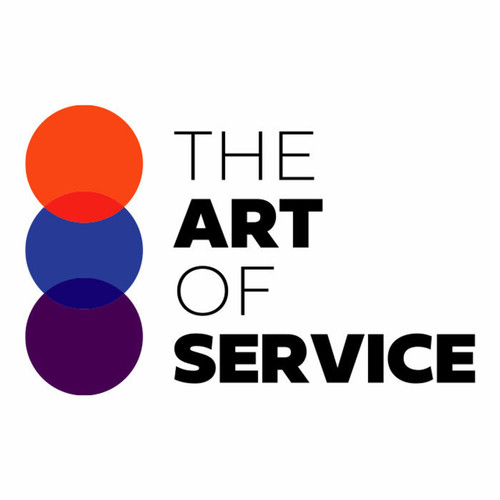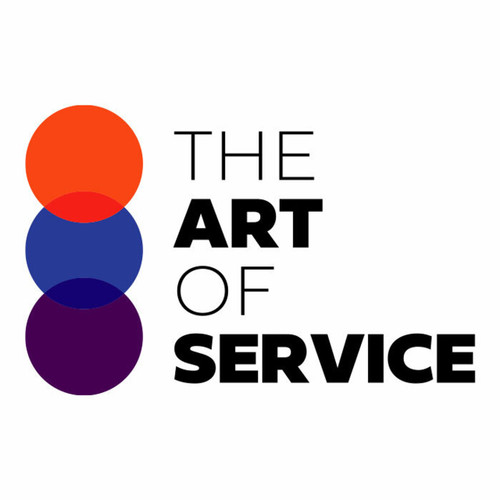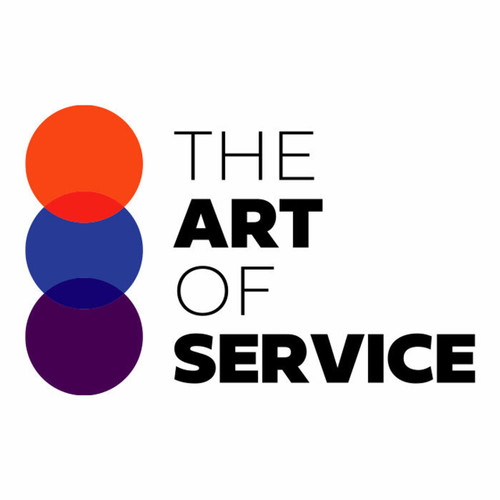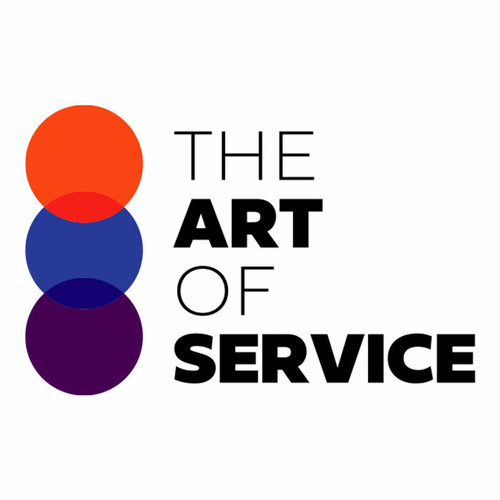Are you tired of constantly searching for answers to your clients′ mobility needs? Look no further, because our Mobility As Service Agreements and Knowledge Base is here to make your job easier.
Our comprehensive dataset contains over 1500 prioritized requirements, solutions, benefits, and results for Mobility As Service Agreements and Mobility as a Service.
Our expert team has carefully curated this information to ensure that it covers the most urgent and important questions, saving you time and effort.
But what sets us apart from our competitors and alternatives? Our product is specifically designed for professionals like you, making it the perfect tool for your business.
And with our DIY/affordable option, you won′t have to break the bank to access this valuable resource.
Our dataset provides a detailed overview of Mobility As Service Agreements and Mobility as a Service, including specifications and product types.
You can also compare our product to semi-related product types, giving you a better understanding of how it can benefit your business.
Speaking of benefits, our dataset will help you streamline your processes, improve efficiency, and provide better solutions for your clients′ mobility needs.
And don′t just take our word for it - we have included real-life case studies and use cases to demonstrate the effectiveness of our product.
We understand that as a professional, time is money.
That′s why our dataset is easy to use and readily available for you to access whenever and wherever you need it.
Say goodbye to endless research and hello to quick and reliable answers.
But wait, there′s more!
Our product also offers valuable insights and research on Mobility As Service Agreements and Mobility as a Service, giving you a competitive edge in your industry.
From businesses to individuals, our dataset caters to all, providing a wide range of benefits for everyone.
Now, you might be wondering about the cost.
We are proud to offer our product at a competitive price that delivers maximum value for your investment.
Plus, with the pros and cons clearly outlined, you can make an informed decision about whether this product is right for you.
So what are you waiting for? Don′t let the complexity of Mobility As Service Agreements and Mobility as a Service hold you back.
With our dataset, you′ll have all the necessary tools and information at your fingertips to excel in your profession.
Try it today and see the difference for yourself!
Discover Insights, Make Informed Decisions, and Stay Ahead of the Curve:
Key Features:
Comprehensive set of 1513 prioritized Mobility As Service Agreements requirements. - Extensive coverage of 111 Mobility As Service Agreements topic scopes.
- In-depth analysis of 111 Mobility As Service Agreements step-by-step solutions, benefits, BHAGs.
- Detailed examination of 111 Mobility As Service Agreements case studies and use cases.
- Digital download upon purchase.
- Enjoy lifetime document updates included with your purchase.
- Benefit from a fully editable and customizable Excel format.
- Trusted and utilized by over 10,000 organizations.
- Covering: Effectiveness Monitoring, Connected Mobility, Sustainable Business Models, Sustainability Impact, Payment Flexibility, Mobile Ticketing, On Demand Transportation, Sustainable Urban Development, Action Plan, Data Sharing And Integration, Accessibility Policies, Emerging Technologies, Legal Liability, Data Transparency, Responsive Communication, Centralized Data Management, Electric Car Charging, Electronic Ordering, Service Operating Models, Mobility Infrastructure, Intelligent Transportation Systems, Material Sorting, Performance Data, Real Time Traffic Information, IT Staffing, Shared Mobility Benefits, Route Planning, Field Mobility, Sustainable Transportation, Data generation, Vehicle Electrification, Modal Choice, Vehicle Emissions, Mobile Wi Fi Connectivity, Risk Practices, Mobility Hubs, Mobile Accessibility Features, Geolocation Services, Multi User Accounts, User Preferences, Digital Navigation Services, Internal Transport, Mobile Payments, Automated Vehicles Management, Service Delivery, Future Applications, Electric Mobility, Data Strategy, Service Reviews, Service Collaborations, Sustainable Mobility, Service Desk Effectiveness, Mobile Accessibility, Ride Sharing Services, Corporate Security, Digital Fare Payments, IT Managed Services, On Demand Delivery Services, Location Aware Services, Mobile Devices, Public Transportation, Gamification In Transport, Mobility as a Service, Product Scalability, Asset Renewal, Service Interface, Multi Language Support, Service Efficiency, Urban Mobility, Employee Behavior, Enhanced Mobility, Resource Allocation, ERP Service Level, Data Portability, Decision Support, Environmental Impact Mitigation, Supplier Quality, Electric Vehicle Charging Stations, Robotic Process Automation, Last Mile Solutions, Fleet Management, Multi Modal Transportation, Vetting, Ride Sharing, Car Sharing, Autonomous Vehicles, Mobile Rewards Programs, Clean Transportation, Workforce Mobility, Self-Driving Cars, DR Scenario, Sustainable Urban Planning, Smart Mobility Solutions, Technology Strategies, Future Of Connectivity, Electric Vehicles, Mobility Analytics, Network Congestion, Mobility As Service Agreements, Value Added Services, Asset Management Strategy, Innovation Risks, Asset Sharing, Global Mobility Services, Carbon Emission Tracking, Privacy And Security Measures, Smart City Integration, Service Activation, IT Service Objectives, Real Time Transit Tracking, Smarter Cities
Mobility As Service Agreements Assessment Dataset - Utilization, Solutions, Advantages, BHAG (Big Hairy Audacious Goal):
Mobility As Service Agreements
Mobility as Service agreements involve collaborative partnerships between different service providers to offer a seamless and integrated transportation network to users. These agreements may involve sharing data and infrastructure to improve efficiency and convenience for users.
1. Yes, agreements can lead to data-sharing between different mobility service providers, allowing for more efficient routing and planning.
2. This can also lead to more affordable pricing for consumers, as multiple services may be combined into one payment plan.
3. Data-sharing agreements can also improve overall transportation systems by identifying areas of high demand and increasing availability of services in those areas.
4. By sharing infrastructure, such as charging stations for electric vehicles, mobility service providers can reduce costs and provide a more seamless experience for customers.
5. Collaborative agreements can also lead to the development of new technologies and services, providing more options for consumers and promoting innovation within the industry.
6. By sharing data related to customer preferences and behavioral patterns, mobility service providers can personalize their offerings and improve customer satisfaction.
7. Increased cooperation through agreements can also result in a more streamlined and interconnected mobility system, making it easier for people to navigate and access different modes of transportation.
8. Sharing data and infrastructure can also lead to a reduction in traffic congestion and air pollution as people opt for more sustainable and efficient modes of transportation.
9. Data-sharing agreements can also help improve safety and security by providing real-time information to providers and enabling quick responses to emergencies or disruptions.
10. Overall, mobility service agreements that promote data and infrastructure sharing can result in a more integrated, cost-effective, and convenient transportation system for both consumers and providers.
CONTROL QUESTION: Do any of the agreements lead to sharing data and infrastructure?
Big Hairy Audacious Goal (BHAG) for 10 years from now:
By 2031, our Mobility as a Service agreements will have revolutionized the transportation industry by creating a sustainable and interconnected network of shared data and infrastructure. These agreements will lead to seamless integration between different modes of transportation, making it possible for individuals to travel from point A to point B without ever having to own a personal vehicle.
Through our agreements, we will have fostered a culture of collaboration among various transportation providers, including public transit systems, ride-sharing companies, bike-sharing programs, and more. This will allow for the efficient use of resources and a reduction in single-occupancy vehicles, leading to a decrease in carbon emissions and improved air quality.
Furthermore, our agreements will prioritize the sharing of data and infrastructure, allowing for real-time information on transportation options, such as traffic conditions, arrival times, and availability of shared vehicles. This data sharing will also enable cities and transportation agencies to make informed decisions about infrastructure improvements and traffic management.
In a world where mobility is seamless and sustainable, our Mobility as a Service agreements will have played a crucial role in reshaping our cities and improving the quality of life for all. We envision a future where transportation is affordable, accessible, and environmentally friendly thanks to the power of collaboration and data sharing.
Customer Testimonials:
"I`m using the prioritized recommendations to provide better care for my patients. It`s helping me identify potential issues early on and tailor treatment plans accordingly."
"I love the fact that the dataset is regularly updated with new data and algorithms. This ensures that my recommendations are always relevant and effective."
"It`s refreshing to find a dataset that actually delivers on its promises. This one truly surpassed my expectations."
Mobility As Service Agreements Case Study/Use Case example - How to use:
Client Situation:
Our client, a leading mobility provider, was faced with the challenge of adapting to the changing preferences of consumers for alternative modes of transportation. With the rise of ridesharing and bike-sharing services, the demand for traditional modes of transportation such as owning a car or using public transport has decreased. In order to remain competitive and retain their customer base, our client decided to explore the concept of Mobility as a Service (MaaS) agreements.
Mobility as a Service (MaaS) is an emerging business model that offers integrated and seamless transportation services to users through a single platform. This includes options like booking and paying for diverse modes of transportation such as car-sharing, bike-sharing, ride-hailing, and public transit all in one app. Our client saw this as an opportunity to not only provide better services to their customers but also to generate additional revenue streams. However, they were unsure of the legal implications and potential data and infrastructure sharing that may arise from entering into MaaS agreements with other mobility providers.
Consulting Methodology:
Our consulting team used a holistic approach to identify, assess, and provide recommendations regarding the potential data and infrastructure sharing in MaaS agreements. The following methodology was used:
1. Research and Analysis: A thorough literature review was conducted on the existing MaaS agreements and their impact on data and infrastructure sharing. This included consulting whitepapers, academic business journals, and market research reports.
2. Stakeholder Interviews: Key stakeholders from our client′s organization, as well as other mobility providers, were interviewed to understand their current understanding, concerns, and expectations regarding MaaS agreements and data and infrastructure sharing.
3. Risk Assessment: A risk assessment was conducted to identify potential legal, financial, and operational risks associated with data and infrastructure sharing in MaaS agreements.
4. Cost-Benefit Analysis: A cost-benefit analysis was conducted to evaluate the potential benefits of data and infrastructure sharing in MaaS agreements and assess the associated costs and risks.
Deliverables:
Based on our methodology, the following deliverables were provided to the client:
1. MaaS Agreement Framework: A comprehensive framework was developed for MaaS agreements that outlines the legal, financial, and operational aspects of data and infrastructure sharing.
2. Risk Management Plan: A risk management plan was provided to mitigate the potential risks associated with data and infrastructure sharing in MaaS agreements.
3. Cost-Benefit Analysis Report: A detailed report was provided that highlighted the potential benefits of data and infrastructure sharing and the associated costs and risks.
Implementation Challenges:
The biggest implementation challenge identified was the lack of standardized guidelines and regulations for MaaS agreements. As the concept is still relatively new, there is no specific legal framework governing data and infrastructure sharing in MaaS agreements. This could lead to disputes and conflicts among mobility providers, affecting the overall success of MaaS agreements.
KPIs:
The following KPIs were suggested to measure the success of implementing the recommendations provided by our consulting team:
1. Percentage increase in revenue through MaaS agreements
2. Percentage decrease in transportation costs for consumers using the MaaS platform
3. Number of MaaS agreements signed with other mobility providers
4. Customer satisfaction level with the MaaS platform and services offered
Management Considerations:
Our consulting team also provided the following management considerations to our client to ensure the successful implementation of our recommendations:
1. Continual Review and Update: As the concept of MaaS agreements and data and infrastructure sharing is constantly evolving, it is important for our client to continually review and update their agreements and strategies.
2. Collaboration and Communication: Collaboration and open communication with other mobility providers are essential for successful data and infrastructure sharing in MaaS agreements. Our client should actively engage with potential partners, align their goals, and establish trust and transparency in their relationships.
3. Adherence to Regulations: As mentioned earlier, there are no specific regulations for MaaS agreements and data and infrastructure sharing. However, our client should monitor any potential changes in regulatory frameworks to ensure compliance.
Conclusion:
In conclusion, our consulting team provided a comprehensive framework and recommendations for our client to successfully enter into MaaS agreements and embrace data and infrastructure sharing. Through our thorough research and analysis, we were able to identify the potential benefits and challenges of data and infrastructure sharing in MaaS agreements and provide solutions to mitigate risks. Our client now has a solid foundation to build their MaaS strategy and capitalize on the opportunities that this emerging business model presents.
Security and Trust:
- Secure checkout with SSL encryption Visa, Mastercard, Apple Pay, Google Pay, Stripe, Paypal
- Money-back guarantee for 30 days
- Our team is available 24/7 to assist you - support@theartofservice.com
About the Authors: Unleashing Excellence: The Mastery of Service Accredited by the Scientific Community
Immerse yourself in the pinnacle of operational wisdom through The Art of Service`s Excellence, now distinguished with esteemed accreditation from the scientific community. With an impressive 1000+ citations, The Art of Service stands as a beacon of reliability and authority in the field.Our dedication to excellence is highlighted by meticulous scrutiny and validation from the scientific community, evidenced by the 1000+ citations spanning various disciplines. Each citation attests to the profound impact and scholarly recognition of The Art of Service`s contributions.
Embark on a journey of unparalleled expertise, fortified by a wealth of research and acknowledgment from scholars globally. Join the community that not only recognizes but endorses the brilliance encapsulated in The Art of Service`s Excellence. Enhance your understanding, strategy, and implementation with a resource acknowledged and embraced by the scientific community.
Embrace excellence. Embrace The Art of Service.
Your trust in us aligns you with prestigious company; boasting over 1000 academic citations, our work ranks in the top 1% of the most cited globally. Explore our scholarly contributions at: https://scholar.google.com/scholar?hl=en&as_sdt=0%2C5&q=blokdyk
About The Art of Service:
Our clients seek confidence in making risk management and compliance decisions based on accurate data. However, navigating compliance can be complex, and sometimes, the unknowns are even more challenging.
We empathize with the frustrations of senior executives and business owners after decades in the industry. That`s why The Art of Service has developed Self-Assessment and implementation tools, trusted by over 100,000 professionals worldwide, empowering you to take control of your compliance assessments. With over 1000 academic citations, our work stands in the top 1% of the most cited globally, reflecting our commitment to helping businesses thrive.
Founders:
Gerard Blokdyk
LinkedIn: https://www.linkedin.com/in/gerardblokdijk/
Ivanka Menken
LinkedIn: https://www.linkedin.com/in/ivankamenken/











